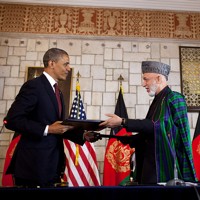This past week, during an unannounced visit to Kabul, U.S. Secretary of State Hillary Clinton declared that the Obama administration had designated Afghanistan a “major non-NATO ally.” Though the status does not carry with it any sort of legal expectation that the United States will consider an attack against Afghanistan as an attack on the U.S., it is one of the most significant designations in America’s diplomatic arsenal in terms of upgrading a bilateral relationship outside a formal treaty of alliance.
Most reports indicate that this status was granted to Afghanistan to reassure the government of Afghan President Hamid Karzai that the U.S. does not plan to abandon him after transferring responsibility for Afghan security to Afghan forces in 2014. But this is a troubling development, for it reveals the lack of trust Kabul has in Washington’s promises, even after months of Obama administration statements about the depth of America’s post-2014 commitment to Afghanistan.
The status conferred on Afghanistan requires the approval of both the secretaries of defense and state, and it is not merely an honorary position casually bestowed. A country so designated is able to take part in cooperative research and development projects with the U.S. Department of Defense and purchase advanced U.S. weaponry without being subject to many of the provisions of the Arms Control Export Act. The status also allows its companies to bid on some U.S. military contracts. And while there are no legally binding provisions committing the United States to defend the territorial integrity and sovereignty of such allies, being so designated usually indicates that the country in question is vital to U.S. national interests and that its well-being is of concern to Washington.

